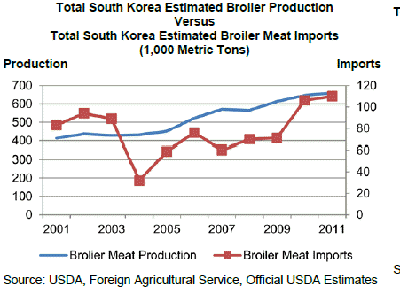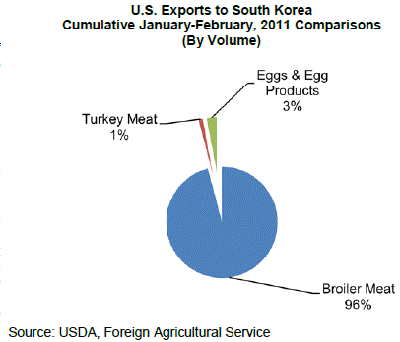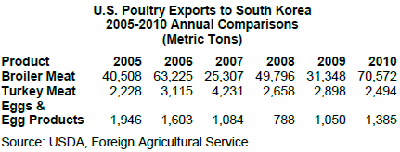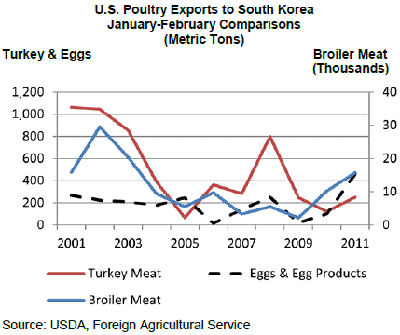



International Egg and Poultry Review: South Korea
SOUTH KOREA - This is a weekly report by the USDA's Agricultural Marketing Service (AMS), looking at international developments concerning the poultry industry. This week's review looks at the poultry industry in South Korea.South Korea is experiencing rising inflation and raised its seven-day repo rate in March to counteract the rising prices. However, the Bank of Korea stated in April it still expects consumer prices to keep going up due to increased economic activity and higher oil prices. However, some of South Korea's inflationary pressures may have been influenced by February 2011 government total foot and mouth (FMD) loss estimates of US$2.7 billion for their hog and cattle industries resulting in higher domestic pork prices. At the same time this winter, South Korea experienced an outbreak of highly pathogenic avian influenza H5N1, resulting in the culling of more than five million birds, which also helped chicken prices to trend higher.
The Ministry of Strategy and Finance (MOSF) held a meeting on 22 April 2011 to discuss the stabilisation of consumer prices. The South Korean press release went on to state that even though livestock prices were gradually stabilising as outbreaks of FMD have abated and imports have grown, chicken and pork prices continued to be higher than the yearly average. They went on to state plans were being made to introduce a quote tariff for chicken and duty-free imports of pork will continue to enter the market.
On 3 May 2011, MOSF, in response to recent price hikes, announced 50,000 metric tons of chicken meat will be exempt from import tariffs until the end of 2011 along with seven other imported items subjected to temporary duty exemptions or reductions. MOSF also add 20,000 additional metric tons of pork belly meat subject to zero duties by the end of June. The chicken quota allocations will begin in May 2011. Over the next decade, USDA is projecting South Korea poultry imports to grow 16 per cent.
In response to an agricultural sector that has frequent disease outbreaks, South Korea is introducing a livestock permit system in 2012. The permit system is in response to the South Korean government finding that many of FMD and bird flu outbreaks were in response to farmers not decontaminating themselves, employees and animals.
Sources: USDA, AMS, Poultry Market News & Analysis, International Egg & Poultry Review; Republic of Korea; USDA, Foreign Agricultural Service; various news wires.




Further Reading
| - | You can view the full report by clicking here. |








